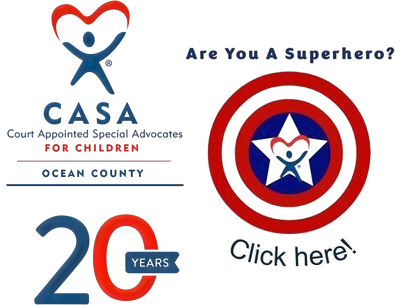What is a CASA volunteer?
A Court Appointed Special Advocate (CASA) volunteer is a specially-trained citizen appointed by a family court judge to represent a child victim in cases of abuse and neglect.
What does a CASA volunteer do?
Advocating for the best interest of a child, a trained CASA provides a judge with carefully researched details about the child to help the court make a sound decision about that child’s future. He or she recommends to the judge what the child needs to be safe and what is in the best interest for a permanent home. The CASA makes recommendations to the judge in the form of a report, attends the child’s hearings and follows through on the case until it is permanently resolved.
What training does a CASA volunteer receive?
CASA volunteer advocates receive 30 hours of classroom instruction from program staff, and other professionals in our community. After the classroom instruction is complete the volunteer is sworn in by the family court judge. Thereafter, volunteers are required to fulfill 12 hours of in-service training per year.
What is the CASA philosophy?
The CASA concept is based on the commitment that every child has the right to a safe, permanent home. The Children in Court judge appoints a volunteer to the child’s case. The volunteer then becomes an official part of the judicial proceedings, working alongside attorneys and social workers as an appointed officer of the court. Unlike attorneys and social workers, however, the CASA volunteer speaks exclusively for the child’s best interests. By handling only one or two cases at a time, the CASA volunteer has time to thoroughly explore the history of each assigned case. CASA is the only program where volunteers are appointed by the court to represent a child’s best interests.
How does a CASA volunteer investigate a case?
To prepare a recommendation, the CASA volunteer talks with the child, parents, family members, case managers, school officials, health providers, and others who are knowledgeable about the child’s history. The CASA volunteer also reviews all records pertaining to the child – school, medical, case manager reports, and other pertinent documents.
How does a CASA volunteer differ from a social service caseworker?
Caseworkers generally are employed by state governments. They sometimes work on over 20 cases at a time while CASA volunteers are able to provide their full attention to just one family at a time. No state agency could ever afford to provide the kind of one-on-one assistance that CASA makes available to children and families. The CASA volunteer does not replace the caseworker; he or she is an independent appointee of the court. The CASA volunteer can thoroughly examine a child’s case, has knowledge of community resources, and can make a recommendation to the court independent of state agency restrictions.
How long does a CASA volunteer remain involved with a case?
Our CASA program requires a minimum one-year commitment with the ultimate goal of the volunteer continuing until the case is permanently resolved and permanency has been achieved. That is because one of the primary benefits of the CASA program is that, unlike other court principals who often rotate cases, the CASA volunteer is a consistent figure in the proceedings and provides continuity for a child.
Is there a “typical” CASA advocate?
CASA volunteers come from all walks of life with a variety of professional, educational and ethnic backgrounds.
How much time does it require?
Each case is different. A CASA volunteer does research and conducts interviews prior to the first court appearance. Once initiated into the system, volunteer advocates work, on average, 5-15 hours per month depending on the complexity of the case to which they are assigned.
How are CASA programs funded?
CASA programs depend on their communities to support the service. Foundations, corporations, fundraising events, annual giving and grants are just some examples of the ongoing support received by local CASA programs.
How effective have CASA programs been in the lives of foster children?
Research suggests that children who have been assigned CASA volunteers tend to spend less time within the foster care system than those who do not have a CASA volunteer. Judges have also observed that children assigned a CASA also have better chances of finding permanent homes than children not assigned a CASA.
How many CASA programs are there in the State of NJ?
There are 14 independent CASA programs serving each of the NJ court vicinages. Every county has a CASA program.
How can I donate to CASA?
There are many ways you can donate here.
How can I get more information about CASA of Ocean County?
We would be happy to talk with you or forward any information you may need. Please contact us here. Feel free to call (732) 797-0590 to speak with Ariane Yazdan, Executive Director.
- Attend Court & CPR hearings
- Attend Case Planning, ISP, IEP and Annual Review Meetings
- Gather reports from schools, therapists, etc. and share with DCP&P
- Visit foster homes, birth parents, etc. on a regular basis and share impressions with caseworker
- Identify camp placements
- Identify relatives who may be interested in pursuing custody
- Assist caseworker with preparation of searches
- Act as a sounding board for birth and foster parents
- Support foster parents with information and resources for special needs children
- Assist in finding and arranging means of transportation to therapy and visitation (CASA’s can’t provide transportation)
- Make referrals to community resources such as Salvation Army, Jewish Family Services, Big Brother/Sister, etc…
- Assist with obtaining equipment and/or facilities for children’s extracurricular activities
